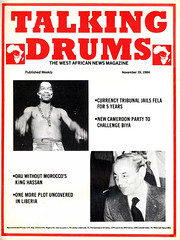Comment
Will The OAU Face Reality Finally?
Predictably there was more bickering and the blowing of hot air than agreement on anything that will help ease Africa's agony. However, the breaking of the myth that has surrounded the accession to the Chairmanship of the OAU must be hailed by all.
In many ways, much of the non-effectiveness of the OAU ought to be blamed on the tradition that has emerged in the more than 20 years of its existence about how the yearly holding of the summit is determined and the consequent accession to the Chairmanship.
Right from the beginning, the politics that surrounded who wins the honour of staging the summit and thus becoming the Chairman of the OAU in the following year has been the most time consuming and energy sapping part of the organisation.
The numbers game, that peculiar counting of African Heads of State who would attend or not attend, played on such a grand scale in Tripoli in 1982 started way back in Accra in 1965.
By the second anniversary of the Organisation, the most important consideration at a summit meeting was already which countries will attend and those who will not attend, depending on the current state of relations between the host country and the other member states.
To get the honour to stage this annual summit, African leaders have stopped at nothing, they would bankrupt their national coffers to be able to build OAU villages to outdo each other in the opulence displayed.
Almost every country that has staged this extravaganza, has had to spend ill affordable funds to build 'suitable' accommodation for his colleagues and goods simply to suit the personal egocentricities, of the leader. Most countries have been left bankrupt after the staging of the summit.
And yet the Chairmanship, for whatever honour that the leaders imagine it would confer on them, has not been known to protect anybody who had held it from internal political problems.
Ghana's President Kwame Nkrumah, after going to all that trouble to stage the OAU summit and virtually bankrupt his nation in the process, fell victim to a coup d'etat less than four months into his Chairmanship. Recently President Tolbert of Liberia after staging one of the most conspicuously extravagant summits, met a most violent death, again only a few months into his chairmanship.
On the other hand, Milton Obote after struggling so hard to get an opportunity to stage the summit, was overthrown before his time came and Africa blessed Obote's successor, the infamous Idi Amin, as Chairman of the OAU.
It is not unlikely that it was the fear and reluctance seeing Colonel Gaddafi of Libya as Chairman of the OAU which led to the abortive summit of Tripoli in 1982.
Undoubtedly, if death had not intervened, the 20th summit would have been in Conakry this year. Doubtless President Sekou Touré would have entertained his guests in the most suitable manner, he would have spared no costs and the participants would have considered it in bad taste to acknowledge that all was not well in their host country, nobody would have noticed or commented on the political prisoners.
The greatest debate would still have been on the sitting of the Sahrawi Arab Democratic Republic, and Chad, and South Africa. Possibly, the old and wily campaigner Sekou Touré would have found a way to avoid the crunch which has now led to King Hassan of Morocco delivering on his long standing threat to withdraw from the OAU.
Now that President Julius Nyerere of Tanzania has been elected Chairman of the OAU without having to host a summit, reality might finally have arrived in the corridors of the OAU. Maybe African leaders will now be able to face up to the awesome economic problems that confront the continent and its people. Possibly, holding the conference in Ethiopia at this time when the image of starving millions has been so forcibly imprinted on the minds of the whole world has helped to concentrate a few minds on the real needs of Africa. Even though it is not impossible to imagine that but for the worldwide activity over the Ethiopian famine, the summit could have been held in Addis Ababa without a single word of acknowledgement from either Colonel Mengistu or his co Heads of State that any famine exists in the country. it might just be that the urge to prove radical or conservative credentials will no longer be so overpowering that the OAU will remain stalemated over trivialities.
Now that the expected demise of the OAU on the withdrawal of a member nation has turned out to be somewhat premature, it is hoped that those who have survived will turn their attentions on to the real problems that confront Africa: famine, drought, debt, under-development and apartheid.
These are problems that face both radical and conservative alike and demand urgent attention. If by being able to elect Julius Nyerere of Tanazania to the Chairmanship without going to Dar-es-Salaam for jamboree, African leaders have demonstrated a will to adopt pragmatic approaches to extricate themselves from seemingly insoluble problems, it is hoped that a similar pragmatic approach can be adopted to the more pressing problems. That will be the only way of showing that the OAU worth saving.
